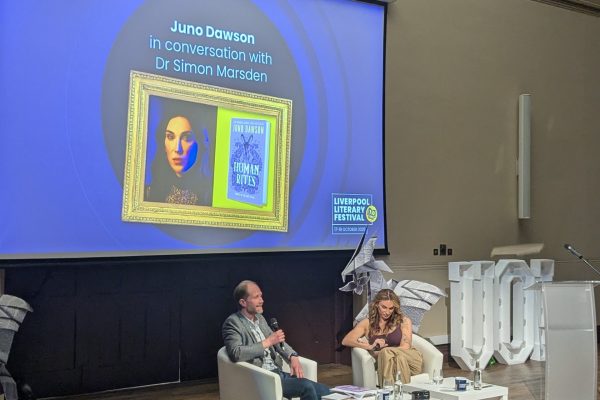6th November 2023
Listen
Listen

For its tenth anniversary, this October, the Liverpool Literary Festival 2025 welcomed readers to the Victoria Gallery and Museum to attend interviews with a range of writers in celebration of all-things literature. On the evening of the 18th of October, I attended the talk with Juno Dawson to hear all about her latest novel Human Rites, which forms the final instalment to the bestselling fantasy series Her Majesty’s Royal Coven.
Interviewed by English lecturer Dr Simon Marsden, Dawson started by discussing the origins of Her Majesty’s Royal Coven, and her choice to write about witches. Prior to this series, her fiction had catered primarily to a young adult audience, and when book-touring for some previous work, she had the realisation that it was time for her future writing to turn to an older readership. To do this, she thought about what she, a millennial, would like to read, and landed on the idea of Desperate Housewives but with witches. And so, Her Majesty’s Royal Coven was born.
Adding to this, Dawson highlighted the year of 2018 as the time when ideas for Her Majesty’s Royal Coven started to flow, a year when the Gender Recognition Act and self ID were increasingly subject to debate within politics and the media, hence leading to a rise in prejudice against trans people, which Dawson described as feeling like a “witch-hunt”. Moreover, she discussed her fascination in the history of witches, noting that witch-hunting often meant persecuting sex-workers, poor women and older women. There is now a sense that “the Witch” has become a reclaimed feminist figure.
Contextualising the time in which she began writing the series, Dawson looked back to 2020, a year of lockdowns and self-isolating, highlighting something she missed most during this period was time spent with her girls. She noted that when women get together, it is “kind of magic”. Differing from traditional romance fantasy, Her Majesty’s Royal Coven is a story about women, how much they mean to each other, and the power they hold when they come together. However, as Dawson underlined, that is not to say that feminism equals friendship, and division is an important theme that she explores throughout the series.
When forming the villains for the series, Dawson took it as an opportunity to try to understand why people are transphobic. This proved difficult, as she knew it couldn’t be based on truth. In the end, she found the bottom line is that transphobia is based on prejudice, bringing her to the realisation that she can’t do anything about how people respond to her and it’s not her responsibility to do so. Thus, Dawson highlighted how the process of writing Her Majesty’s Royal Coven proved to be a freeing experience.
Focussing on the lives of women in their 30s and 40s, Her Majesty’s Royal Coven steers clear of the sometimes-questionable emphasis of youth in female characters in typical fantasy novels, and instead centres women at an age that society tells them to fear. Dawson noted that she has never felt better than she does now, in her 40s. On the topic of age, Marsden drew attention to Dawson’s references to pop culture throughout the books, giving the example a reference to the Spice Girls. To this, Dawson joked that a Book-Tok reviewer had described the writing in Human Rites as “quite millennial”, to which she thought well… yeah. To me, Dawson’s decision to write a series about women existing beyond their twenties comes as a breath of fresh air.
Written in third person and past tense, Dawson’s series Her Majesty’s Royal Coven follows the story of an organisation of women from multiple points of view, providing an intersectional and inclusive representation of womanhood. Throughout her interview, Dawson provided humorous moments, as well as more honest, personal insights into what led her to write the series. I got the sense that anyone who knows what it feels like to be “the Witch” will find solace in this series, and anyone who doesn’t know that feeling, will find something to learn.
To read our other reviews of the Liverpool Literary Festival, please click here:
https://www.liverpoolguildstudentmedia.co.uk/category/arts-culture